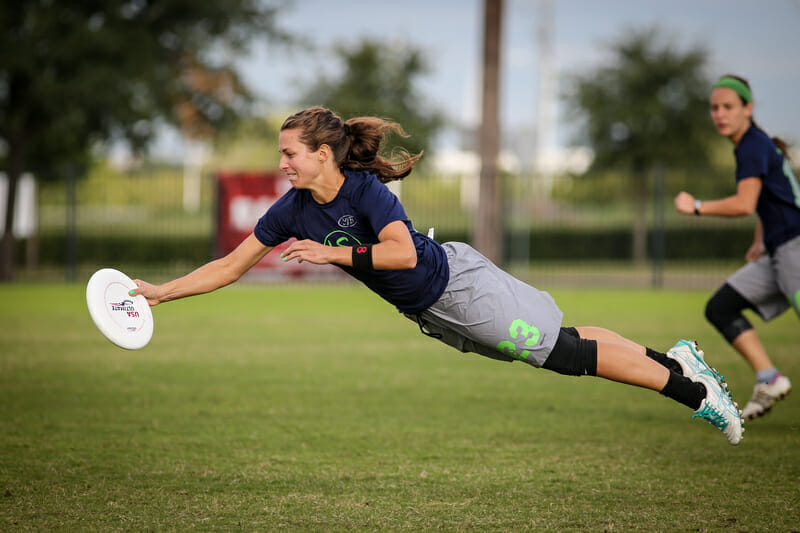January 23, 2014 by Tiina Booth in Opinion with 12 comments
 You didn’t really think I’d let this one slide, did you? Emily Baecher’s recent column on what it means to play ultimate as a woman elicited enough comments and feedback to keep me busy for the rest of the spring.
You didn’t really think I’d let this one slide, did you? Emily Baecher’s recent column on what it means to play ultimate as a woman elicited enough comments and feedback to keep me busy for the rest of the spring.
Her thoughtful and thought-provoking essay clearly struck a nerve, as evidenced by the signed comments from many Ultiworld readers who usually do not post. I could almost hear a collective sigh of relief from across the country from those who fully embraced the wise words of Ms. Baecher.
The excitement generated by this article can be harnessed for positive changes in ultimate.
But before we can figure out how to use this newfound energy, let’s take a look at some recurring issues that continue to derail any type of productive discussion.
Recurring Issue #1: Assuming that criticism will sway those running the pro leagues
I am ambivalent about the product that the MLU and AUDL are putting out. I have been to a few games and Ponylite vs. Ironlite just doesn’t do it for me. I would much rather watch them play on a blustery fall day in Devens, when something real is on the line. I don’t understand the dancing girls and I sure as heck have no idea what a “sponsored” player is all about.
But I also know that I am not their targeted audience. The entrepreneurs who are running these enterprises are under a lot of pressure. I understand that pressure well, as I have failed at ultimate financial endeavors before and will probably fail again.
And while it is perfectly fine to share your vision of what kind of league you would like to see, I think this lobbying is misplaced. They are going to do exactly what they want. The pro leagues are not the ones responsible for gender inequality in our sport, and they are not going to be the ones to fix it. Because they are so visible and are putting out a “traditional“ product, they have been the target for other grievances. So if you want to spend some energy making sure gender equity is a reality, look at your local ultimate community, your leagues, and USA Ultimate.
Recurring Issue #2: Extrapolating from the individual to the group
Notice that above I said that I am not a huge fan of the pro leagues. I did not say, “I dislike the men’s pro leagues because they are inferior to the club series and, let’s face it, no one really wants to go to see them play. That‘s just fact.” I even plan on attending more of their games this spring.
Yet it seems that quite a few readers made that leap again and again when it comes to women‘s ultimate and women’s sports in general:
[quote]But when you are considering viewers, it unfortunately does have to be addressed which people enjoy watching more. The bottom line is that men are better athletes, and if women really were just as good athletes, they would start to make open teams. So if viewers want to watch the top athletes at a given sport, it’s going to pretty much only be men’s/open.[/quote]
Gwen Ambler and others disputed this theory and clearly explained the many reasons why spectators choose a sport to watch and support:
[quote]How popular a sport or division within a sport is has much, much more to do with marketing, money, history, etc. than it does with any intrinsic value of the game itself. And to ignore the fact that sexism has a hand in all of those elements is to be blind.
The “better athletes” rationale for why men’s sports receive more attention than women’s doesn’t hold up in non-gendered comparisons, like between men’s NCAA basketball or football and the NBA or NFL. Why would anyone want to watch March Madness or BCS bowl games when it’s not the top athletes in the sport?[/quote]
Supporting a certain sport or player is a personal choice and your argument does not become stronger if you maintain that everyone else feels the same way.
And remember that Emily is not speaking for every female ultimate player. She simply told her story. While her experiences resonated with many women, other players have taken different paths and have differing viewpoints.
Recurring Issue #3: Refusing to recognize that agitation and action are BOTH necessary for change.

Some readers want women to shut up and build their own institutions. They should stop complaining and do something. We saw this sentiment repeatedly with online discussions about live streaming, NexGen, the Triple Crown Tour, ESPN coverage and, of course, the pro leagues.
Without going all Women Studies 101 on you, a society needs both words and action in order to undergo authentic change. There must be protest. The building of new coalitions, institutions and strategies takes time, money and, yes, passionate discussion. But people with power do not willingly give it up to the group that they consider The Other and it is naïve to think that ultimate is any different.
I believe that Emily’s article will serve as a benchmark for discussions about gender and ultimate in the months, and maybe years, to come. How do we move forward from here?
1. Take an Equity Inventory
If you are part of an active ultimate community, look critically at yourselves and each other. Some questions to consider:
- Do all teams have equal access to coaches, fields, trainers, practice times, transportation, funding?
- Are women players treated with respect on and off the field?
- Do easy insults of women often go unchallenged?
- How are mixed ratios determined in league play?
- How and why are roles assigned on mixed teams?
- How are administrative tasks divided up?
- And, finally, that oldie but goodie from the early 80‘s: If a woman drops a pass, will she get thrown to again?
2. Use Your Voice
I spent a good portion of my teaching life exhorting young women to use their voice. Whether it was in classroom discussion or writing an essay, these students were often reluctant to state an opinion. If they did, they were most likely to overthink it and would only share when they knew there was little social risk. In general, young men do not suffer under these kind of constraints. They are given the freedom of confident action from an early age and this often translates into their controlling conversations online and in person.
Those days need to be over. We need to hear the voices and stories and opinions and rants of women ultimate players, with passion and without apology. I, for one, would really like to hear some different narratives. How does a woman choose to play on a mixed or single gender team? What is it like to switch from one division to the other? What was it like for Tina MacDowell to play at college nationals on a men’s team? What stories does Michelle Ng have about captaining a boys baseball team? What kind of struggles are novice women experiencing when they try to start a new team? Everyone has a story.
I understand the unwillingness of women to use their words. Emily was reluctant at first to tell her story and I almost didn’t take Charlie Eisenhood’s offer to write this column. But I figured that if Malala Yousafzai can take a bullet from the Taliban, I can certainly put up with some anonymous haters.
3. Build It.
I have a tremendous amount of experience in starting ultimate ventures before there was a mandate to do so. I learned early on that not every idea is a good idea. We only had 8 teams at the first Amherst Invitational (and 4 of them were from Bronx Science), my first day camps failed, the UPA did not want us to hold Junior Nationals in 1998, we only had 28 campers at our first session of NUTC, and the UCPC is having difficulty breaking even.
Yet that has not stopped me and it shouldn’t stop you.
I was particularly impressed with Kevin Minderhout’s thoughtful questions after Emily’s article. He took a lot of heat for choosing an all-male roster for NexGen, yet he built something that no one has done before. Probably lost money at it too. And yet he still is asking questions about how to promote ultimate for everyone.
The “It” you build does not have to cost a lot or be on a national level. Riot has been sending young women for years to NUTC and Next Level. Emily told me last week that she wants to offer a scholarship for NUTC GIRLS, our newest camp session for 2014. From starting a women’s team to teaching a novice how to throw, we are all capable of contributing in a positive way.
And when you see someone taking a risk and building something new, support it, buy it, talk about it and let others know what you are doing. We are still a very small sports community and an individual’s action can effect great changes down the road. Just ask Emily.